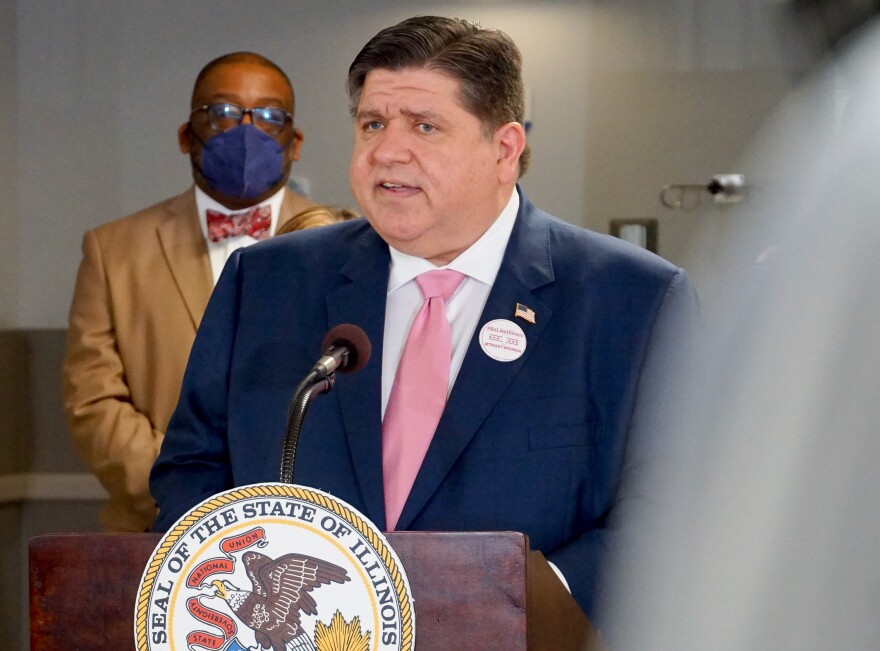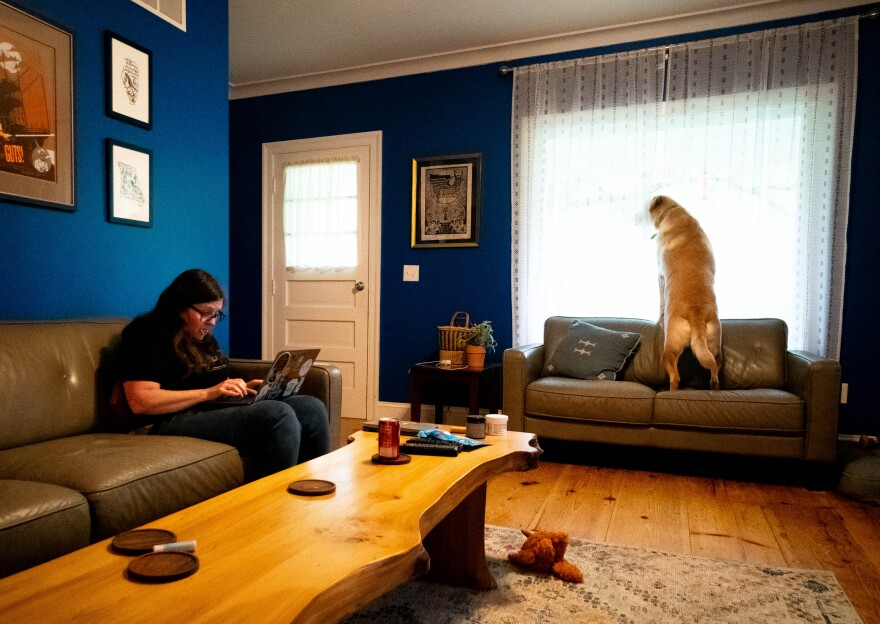At the Hope Clinic for Women in Granite City, the day starts early. Before the doors open at 7:30 a.m., clinic escorts and protesters take positions on opposite ends of the parking lot.
“You’ll remember this for the rest of your life!” one of the protesters shouts at the escorts. “Is it glorious to you [that] you’re participating in the death and destruction of babies?”
The escorts, volunteers from the activist group Pro-Choice Missouri, have started seeing a lot of patients who have traveled far to get to the Metro East clinic.
“I can see a Mississippi plate behind you right now,” escort Justine Collum said. Like the others, she’s clad in a rainbow vest and sometimes carries a large umbrella to shield patients from view.“
"I would say we’ve been seeing a lot of out-of-state plates lately," she said. “There always have been some. But I would say it’s been an increase.”
Between 2014 and 2020, the state saw a more than 200% rise in abortion patients coming from out of state, a total of more than 9,000 abortions, according to data from the Illinois Department of Public Health.
In 2020, about two-thirds of those patients came from Missouri. They also come from other states that have also increased abortion restrictions in the past decade.
Abortion providers are bracing for an expected U.S. Supreme Court ruling that would strike down Roe v. Wade. If that happens, Hope Clinic and other providers in the Metro East are preparing to assist tens of thousands of new patients from across the country.

A growing destination
Southern Illinois is surrounded by states that are set to severely restrict abortions if the high court overturns the 1973 decision that legalized the procedure, according to the Guttmacher Institute, which tracks abortion legislation nationwide. Missouri, Kentucky, Arkansas and Tennessee are all nearby states whose Republican-controlled legislatures that would outlaw abortion as soon as the decision is thrown out.
“It's just going to kind of look like it looks right now, except for on steroids," said Michele Landeau, board president of the Missouri Abortion Fund, which helps patients pay for the procedure. “There's going to be people who are traveling much, much, much longer distances and having to jump through a lot of different hoops.”
Planned Parenthood officials expect 14,000 more patients per year at the clinic in Fairview Heights alone.
Illinois Gov. J.B. Pritzker . The Illinois legislature, controlled by Democrats, codified the right to an abortion in state law in 2019, solidifying the state’s claim as a likely future destination for abortion patients.

‘We knew this was coming’
For years, Dr. Colleen McNicholas, chief medical officer of Planned Parenthood of the St. Louis Region and Southwest Missouri, has been bracing for the Supreme Court decision. For her, the question wasn’t “if” the court would overturn Roe v. Wade, but “when.”
“We've been waiting for this moment, right?” she said, sitting at the . “We knew that this was coming.”
The organization in 2019 opened the large clinic in Fairview Heights just across the Mississippi River from St. Louis as the Republican-controlled Missouri legislature further increased abortion restrictions. Missouri lawmakers previously passed laws that require patients to undergo ultrasounds and multiple clinic visits before they get an abortion.
McNicholas also spearheaded building a call center inside the facility that serves patients at the two abortion providers in the Metro East: the Hope and Planned Parenthood facilities. Workers at the call center connect callers to financial support, transportation and other assistance, a service McNicholas describes as vital as people in states with restrictive abortion laws run out of options.
“It doesn't take a whole lot of time working in those places — Missouri, Kansas, Oklahoma — to understand that people's ability to access abortion care 100% in this country depends on where they live and how much money they have,” she said.

The region already is seeing an increase of patients after allows citizens to sue those who help someone get an abortion, McNicholas said.
“There has been this massive, massive ripple effect where, as Texans fill the clinics in Oklahoma, then Oklahomans need somewhere to go,” she said. “And that's going to happen state by state, as folks are looking to either completely ban abortion in those states or to severely limit it.”
At least one new clinic to serve more people; earlier this month, a Memphis-based abortion provider announced plans to open a clinic this summer, in Carbondale, about a hour north of the Kentucky border.
Planned Parenthood is gearing up, too. McNicholas said it plans to extend its hours and hire more people. There’s a lot of space in the two clinics in the Metro East, she said, but they’ll need more doctors and other workers to absorb the increase in patients.
Pritzker has called for Illinois health regulators to let nurse practitioners provide abortions that would help with that demand.
A patchwork of access
Grassroots organizations that financially and logistically assist patients also are expecting a huge wave of demand for their services.
Alison Dreith, strategic partnerships director of the Midwest Access Coalition, an Illinois-based abortion fund, works from a laptop out of her living room in rural southern Illinois. On the television, chef Guy Fieri is on mute.

Dreith said watching the cooking channel calms her while she works. Since Texas passed one of the most restrictive abortion laws in the country, she’s been stressed.
“I’m chewing toothpicks, she said. “I quit smoking cigarettes the day SB8 went into effect on Sept. 1. So now I'm, like, a toothpick chewer.”
Because of the nation’s patchwork of abortion laws, patients are already crisscrossing the country to get abortions, she said. She checks off the areas where requests for assistance have come in recent days: Pennsylvania to Ohio; South Dakota to Minnesota; Indiana to Illinois; Iowa to Minnesota.
Dreith plans to send more people to the Metro East in the coming months.
For some patients, it can cost much less to book a hotel or a flight to get an abortion in the Metro East than it does to travel to an appointment in Chicago, she said. Some patients may rather go to a smaller town to get the procedure.
“You know, a lot of people that we support, who are traveling, are coming from small rural communities themselves,” she said. A lot of the patients she helps have never been on an airplane before.
“I don't know how they find Granite City and Fairview Heights, Illinois,” she said. “But it's happening.”
Follow Sarah on Twitter:





